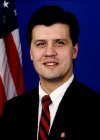
(home)
Protecting Workers' Paychecks
By U.S. Rep. John Hostettler
A few years ago my nephew, a spirited young man, was hired at a local company. After a probationary period he was required to join the union. Upon presenting himself before the steward, he asked, pointedly, "Is this where I sign up so you can take my money to campaign against my uncle in the next election?"
My nephew was being ironic, of course, but his point is valid. On March 26, 1996, at a special convention (only the second in its history) in Washington, D.C., the AFL-CIO made an assessment against its over 11 million members to fund political "education" concerning issues and candidates running for federal office.
The last election raised awareness of this practice and many 8th District union members brought it to my attention. Members of local unions, for example, were concerned that their national AFL-CIO leadership lobbies against English as the official language, promotes abortion on demand and nationalized health care, opposes child tax credits and aggressively pursues other issues that conflict with their own personal beliefs. While at least 40 percent of union membership votes for Republicans, union bosses give money almost exclusively to Democrats, sometimes even working closely (and illegally) with the Democratic National Committee.
Now don't get me wrong. Unions, like any other organization or association, have a right to speak out or campaign on behalf of any issue they choose. The question is, should the unions be able to use deductions from their members' paychecks without their individual permission to promote an agenda those members may oppose?
I agree with a growing number of union members who answer with an emphatic "no." Accordingly, I am a cosponsor of the Paycheck Protection Act, which gives union members a greater say in how their payroll deductions are spent. This bill says simply that no national bank, corporation or union can use financial resources from stockholders, employees or members for political purposes without voluntary and written permission from the individual.
While the benefits for union members is clear, union bosses are concerned by growing support for paycheck protection initiatives. Here's why: In 1992, Washington state voters approved a campaign reform initiative that included paycheck protection. The measure allowed teachers unions to deduct PAC contributions from paychecks, but only with written approval. The number of teachers willing to contribute to their union's political agenda dropped to 8,000 from more than 45,000. The number of public employee union members making PAC contributions fell from more than 40,000 to 82! Giving members a voice in how their dues are spent might mean fewer dollars for labor bosses to spend on politics and that has the AFL-CIO worried.
To understand the lengths some union leaders will take to distort this bill, recent letters to the editor in local newspapers claim the Paycheck Protection Act "aims to bar only union participation from the political process" and "infringes on the First Amendment rights of union members." Neither statement is even remotely accurate, but to avoid any confusion I quote the legislation verbatim:
Except with the separate, prior, written, voluntary authorization of each individual, it shall be unlawful--(A) for any national bank or corporation .... to collect from or assess its stockholders or employees any dues, initiation fee, or other payment as a condition of employment if any part.... will be used for political activity....; and
(B) for any labor organization .... to collect from or assess its members or nonmembers any dues, initiation fee, or other payment if any part .... will be used for political activity...
Another letter writer made the extraordinary claim that "union dues are never, ever spent on political campaigns." Again, untrue. The Associated Press reported last month that "union officials are generally free to use a portion of dues on things besides contract negotiations, such as get-out-the-vote drives, campaign contributions and lobbying on labor issues." In addition, "In some states a portion of dues money may be channeled into PACs."
This same leadership, which describes unions as "democratic, voluntary organizations," is fighting its membership in court to keep the rank-and-file from seeing how their dues are spent. The AFL-CIO, the Air Line Pilots Association and the National Education Association joined ranks against Delta Airline pilots fighting for the right to learn what their compulsory union dues are being used for. A federal appeals court last year ruled in favor of the pilots, but the union bosses appealed to the Supreme Court.
Union leadership is again at odds with the rank-and-file. In California, where a paycheck protection initiative is on the ballot this summer, 69 percent of respondents to the most recent Field Poll said they support the initiative. That number certainly includes a number of union members who recognize that the true First Amendment issue at stake is the right to determine how their hard-earned money is spent.


Eric Seymour






